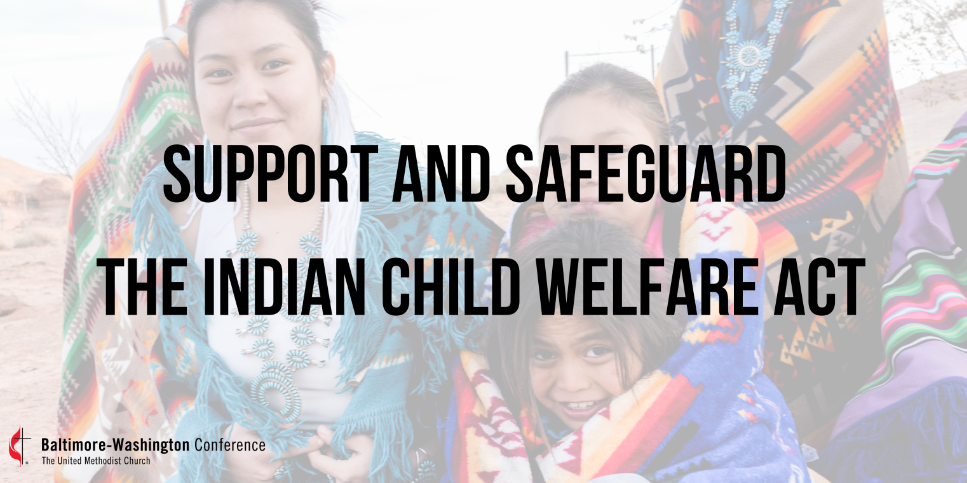
Support and Safeguard The Indian Child Welfare Act
On July 1 2023 the U.S Supreme Court is due to render a decision that will impact the future of the Indian Child Welfare Act. It is urgent that as United Methodists we lift our voices on behalf of God’s children and align our faith with the prophetic call to “learn to good; seek justice, rescue the oppressed; defend the orphan, plead for the widow” (Isaiah 1:17 NRSV).
Congress passed the Indian Child Welfare Act in 1978, amid growing concern that 25% to 35% of Native children were forcibly removed from their families by welfare agencies. The vast majority of children were placed for adoption and foster care outside of Native families, homes, and communities. These practices were perpetrated without consideration to maintain a child’s culture, language, religion, or Tribal citizenship.
The Indian Child Welfare Act corrects this injustice. It reaffirms the inherent rights of Tribal nations to be involved in a child’s welfare and to advocate for the best interests of Native children and families. Twenty-six states and the District of Columbia have enacted laws based on The Indian Child Welfare Act. These laws ensure that priority is given to place Native children with their extended families or communities and to maintain a connection to their Tribal identity and culture.
The case before the U.S. Supreme Court centers on a white Texas couple who adopted a Native child and their dispute with the Navajo Nation over the child’s placement. The couple and their supporters argue that the preference given to Tribes under the Indian Child Welfare Act amounts to race-based discrimination and violates the U.S. Constitution’s equal protection clause.
Supporters of the Indian Child Welfare Act disagree. If this legislation is overturned Tribal nations will lose their ability to advocate for Native adoptions. The decision would set a precedent with a ripple effect on Native sovereignty rights. Twenty six state attorneys general have submitted briefs to the U.S Supreme Court asking that they uphold the Indian Child Welfare Act. Dozens of Native American Tribes and child welfare experts have testified to the importance of the Indian Child Welfare Act and its long-term benefits to Native children.
What Does the Church Say?
Our 2016 United Methodist Resolution “Support for the Indian Child Welfare Act: Education, Health Care, and Welfare” #3346:
Congress, through the US Constitution, statutes, treaties, and the general course of dealing with Indian tribes, is charged with the responsibility for the protection and preservation of Indian tribes and their resources, including Indian children.
The special political status of Indian tribes, as well as the history of biased treatment of Indian children and families under public and non-Indian private child-welfare systems, is the basis for the enactment of the Indian Child Welfare Act (25 U.S.C. § 1901).
The United Methodist Church strongly supports the Indian Child Welfare Act and the critical connection between children and their respective tribes and tribal cultures and traditional practices.
Take Action and Contact The U.S Supreme Court and Congress
The Native American International Caucus of The United Methodist Church (NAIC) respectfully asks that The U.S. Supreme Court and Members of Congress to prioritize the welfare of our Native children and their families and uphold the Indian Child Welfare Act.
We recognize that State and Tribal laws depend on the Indian Child Welfare Act to secure a critical connection between our Native children and their respective Tribal cultures. Overturning the Indian Child Welfare Act will have damaging implications on Federal Indian Laws and policies. Native American classification for political sovereignty rather than racial identity undergirds essential laws that secure equitable access for Native Americans to housing, healthcare, education and employment.
If the Indian Child Welfare Act is overturned it will place in jeopardy more than forty years of Tribal sovereignty and the Federal government’s responsibilities to Native communities, their children and their families. We pray that as a matter of conscience The U.S. Supreme Court and Congress will take seriously its responsibility to protect Native children and strengthen Native families and communities.
